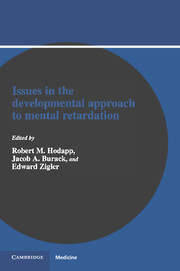Book contents
- Frontmatter
- Contents
- Preface
- Contributors
- Part 1 Developmental theory
- 1 The developmental perspective in the field of mental retardation
- 2 Differentiating mental retardation: The two-group approach and beyond
- 3 One road or many? Issues in the similar-sequence hypothesis
- 4 The similar-structure hypothesis and differential rate of development in mental retardation
- 5 Neo-environmental perspectives on developmental theory
- 6 The role of motivational factors in the functioning of mentally retarded individuals
- Part 2 Applying developmental theory to different types of retarded individuals
- Author index
- Subject index
5 - Neo-environmental perspectives on developmental theory
from Part 1 - Developmental theory
Published online by Cambridge University Press: 07 September 2010
- Frontmatter
- Contents
- Preface
- Contributors
- Part 1 Developmental theory
- 1 The developmental perspective in the field of mental retardation
- 2 Differentiating mental retardation: The two-group approach and beyond
- 3 One road or many? Issues in the similar-sequence hypothesis
- 4 The similar-structure hypothesis and differential rate of development in mental retardation
- 5 Neo-environmental perspectives on developmental theory
- 6 The role of motivational factors in the functioning of mentally retarded individuals
- Part 2 Applying developmental theory to different types of retarded individuals
- Author index
- Subject index
Summary
The role of the environment in human development can never be discussed without a complementary discussion of the role of the individual's constitution. What is outside an individual can only be defined with reference to what is inside. Historically, this dialectical relationship between the organism and its environment has been discussed in mechanistic terms that perpetuate a nature–nurture debate. The mechanistic orientation was based on the view that there are entities such as nature and nurture that can be defined independently of each other, as in the Newtonian concept of objects in space. The contrasting modern view that will be promoted here is that objects are only defined in relation to each other, as in the Einsteinian concept of the relativity of space and time. From this transactional perspective, organism and environment are always in intimate connection, not only in the ontogenetic development of each human, but in the phylogenetic evolution that produced both the human species – a commonly accepted idea – and the human environment – a less commonly accepted or understood idea.
Evolution and development
The theory of evolution led to major changes in the understanding of human behavior across all the disciplines that dealt with the life sciences. The history of changes in biological organization was seen to result from the success or failure of a species' behavior. The existence of every organism is regulated by both internal and external influences.
- Type
- Chapter
- Information
- Issues in the Developmental Approach to Mental Retardation , pp. 93 - 113Publisher: Cambridge University PressPrint publication year: 1990
- 7
- Cited by



